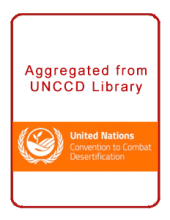Land Library
Welcome to the Land Portal Library. Explore our vast collection of open-access resources (over 74,000) including reports, journal articles, research papers, peer-reviewed publications, legal documents, videos and much more.
/ library resources
Showing items 1 through 9 of 52.The importance of land manifests in various components of the everyday lives of people insocieties: cultural heritage, livelihood, the environment, economy, and community, among manyothers. Land is a factor of development.
Nature-based Solutions (NbS) work with nature to benefit both natural ecosystems and the people that depend on them.
Mapping Together helps people use Collect Earth mapathons to monitor tree-based restoration. Collect Earth enables users to create precise data that can show where trees are growing outside the forest across farms, pasture, and urban areas and how the landscape has changed over time.
This practitioner’s guide explains how to promote gender-responsive forest tenure reform in community-based forest regimes. It is aimed at those taking up this challenge in developing countries.
You cannot put a price tag on nature — but the economic numbers point to its protection,” said Anthony Waldron, the lead author of the report and researcher focused on conservation finance, global species loss and sustainable agriculture.
The State of Agricultural Commodity Markets presents commodity market issues in an objective and accessible way to policy-makers, commodity market observers and stakeholders interested in agricultural commodity market developments and their impacts on countries at different levels of economic dev
Women’s economic empowerment is essential in promoting equality between women and men and is a precondition for sustainable development.
Food security in Africa needs abundant, affordable and nutritious food for the growing population.
•Smallholder farmers lack sufficient land or economic incentives to invest in agriculture.
•The above issues create a ‘wicked problem’ – a conundrum for future food security.
Nature loss is a planetary emergency. Humanity has already wiped out 83% of wild mammals and half of all plants and severely altered three-quarters of ice-free land and two-thirds of marine environments.


